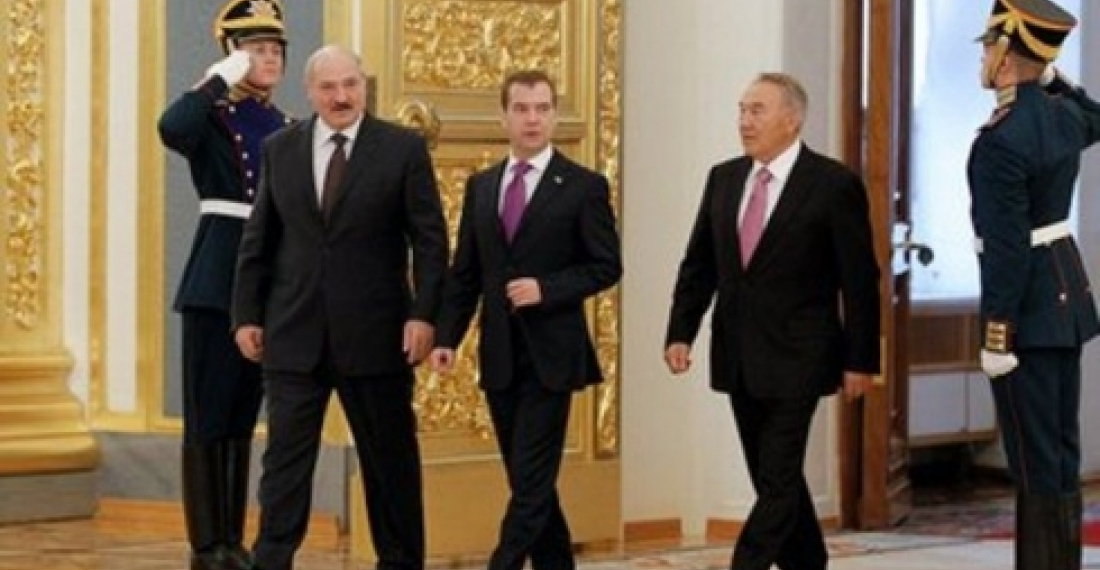The Presidents of Russia, Kazakhstan and Belarus, Dmitry Medvedev, Nursultan Nazarbayev, and Alexander Lukashenko yesterday signed the Declaration on Eurasian Economic Integration, the Treaty on the Eurasian Economic Commission, and the Resolution on the Eurasian Economic Commission Regulations at a ceremony in the Kremlin.
Speaking after the signing ceremony the Russian President did not rule out that the Eurasian Economic Union could be fully established by 2015. "If prerequisites arise, we will move faster. Let's not get ahead of ourselves, let's not lose our heads. If we can, we will move faster," he said. President Medvedev also added that several neighboring countries were interested in participating in the new economic union.
"Our life shows us that our multifaceted cooperation is a great mutual resource and this is why our partners in the EurAsEC and the CIS show interest in a new integration structure," he said.
The Russian President that "The next step (clear to all) is the establishment of the Eurasian Economic Union by 2015. We discussed this too, today. If the conditions are right we will move quicker where possible. We will not run ahead of ourselves and take hasty or excessive steps, but where the opportunities exist we will move ahead faster. We agreed today for the first time on establishing a supranational body, neutral with respect to all three countries, to which we will delegate increasing powers. This is a decision of major significance. I particularly stress that the [Eurasian Economic] Commission’s decision-making mechanisms completely exclude the possibility of any one country dominating over another. This is a body in which all are equal. It will work effectively I hope, on the basis of market-based and democratic principles, and I hope it will draw too on the best of integration practice and experience around the world."
The Russian leader spoke about the European Union and the Euro when answering questions from journalists after the ceremony. He said that "despite the difficulties the EU and the Eurozone are going through today, it is nonetheless a very successful union that has made it possible to create a  huge common market and raise a number of EU member countries that were only very middling in their development to a decent development indeed through integration and mutual help and support. I am not even referring here to the euro, which currently faces problems. But let me repeat something I have said at the G20 meetings and other gatherings: if it were not for the euro, I do not know how the world would have coped with the crisis that broke out in 2008 if the dollar had been the only reserve currency. The euro's current problems arise from the fact that it serves as the currency not just in stronger economies but also in substantially weaker economies or in economies in which particular problems and poor management have created difficulties."
huge common market and raise a number of EU member countries that were only very middling in their development to a decent development indeed through integration and mutual help and support. I am not even referring here to the euro, which currently faces problems. But let me repeat something I have said at the G20 meetings and other gatherings: if it were not for the euro, I do not know how the world would have coped with the crisis that broke out in 2008 if the dollar had been the only reserve currency. The euro's current problems arise from the fact that it serves as the currency not just in stronger economies but also in substantially weaker economies or in economies in which particular problems and poor management have created difficulties."
Medvedev stressed that the new Union will be based on equality saying: "I particularly stress that the [Eurasian Economic] Commission's decision-making mechanisms completely exclude the possibility of any one country dominating over another. This is a body in which all are equal. It will work effectively I hope, on the basis of market-based and democratic principles, and I hope it will draw too on the best of integration practice and experience around the world."
source: commonspace.eu
photos: courtesy of the Press Service of the President of Russia







